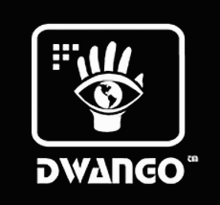Dwango
 |
|
| Developer | Interactive Visual Systems |
|---|---|
| Type | Online service |
| Launch date | December 1994 |
| Platform | DOS, Microsoft Windows |
| Status | Defunct |
| Website | "Official website". Archived from the original on February 7, 1998. |
The Dial-up Wide-Area Network Game Operation, better known by the acronym DWANGO, was an early online gaming service based in the United States. Launched in 1994, it was originally known for its compatibility with Doom, for which it functioned as a matchmaking service for online multiplayer. The service also supported various other titles, including other id Software games such as Doom II and Heretic as well as titles from other companies like Duke Nukem 3D, Blood, and Shadow Warrior from 3D Realms.
To use the service, players would pay a fee and run the DWANGO client software which would dial into a DWANGO server. Initially, a phone number in Houston, Texas had to be dialed, but soon a number of servers in other cities were also set up. However, DWANGO's dial in approach was soon overshadowed by online multiplayer through the increasingly popular Internet and the service ceased operation in October 1998. Its Japanese division has continued to flourish, evolving into the telecommunications/media company which now operates the Niconico video hosting service.
DWANGO was created in early 1994 by Bob Huntley and Kee Kimbrell in Houston, Texas. Huntley had wanted to transition his company Interactive Visual Systems from providing video training to online gaming services. After completing initial development on the service, the two of them pitched the idea to id Software; John Carmack and other id staff were largely uninterested, but the duo found support in John Romero. Jay Wilbur negotiated a deal for 20% of DWANGO's revenues and Romero worked on the project, releasing the first version of the DWANGO software with the shareware release of Heretic. Since it predated widespread consumer access to the Internet, players had to dial long distance to Houston. Even so, it was wildly popular, and the creators reaped a healthy profit from the subscription fees. By early 1995, ten thousand subscribers were paying $8.95 a month, some calling from as far as Italy and Australia. The company set up headquarters in New York City. Soon they set up a franchising system. A flat fee of $35,000 was charged to set up a server and the franchisee could keep the rest of the profits. In four months, 22 servers were set up across the country. In 1996, the service expanded to cover Japan, Singapore and South Korea.
...
Wikipedia
